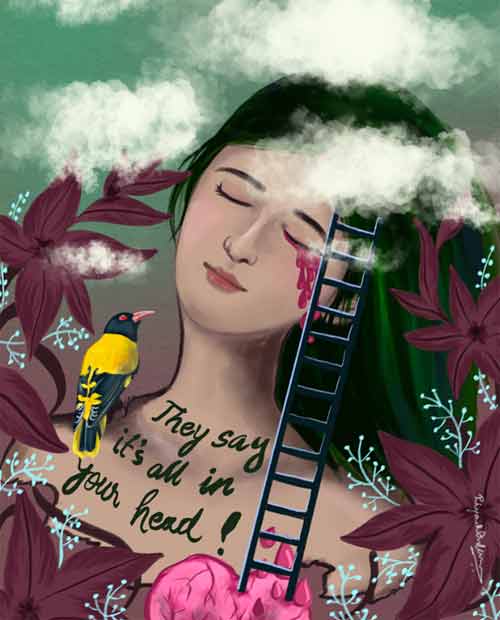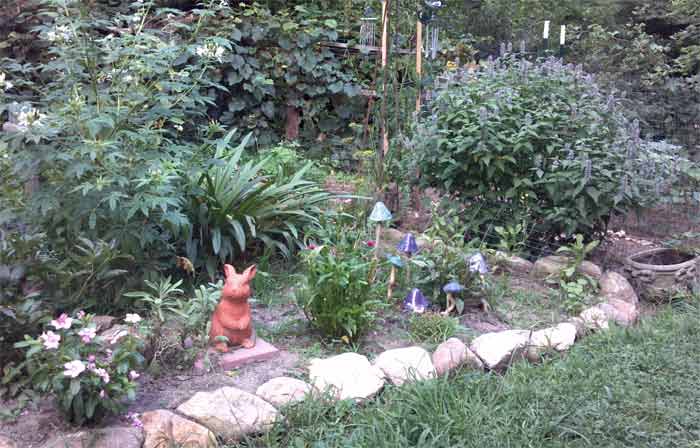Mental health herbs
Herbal medicine has been used to treat mental illness for thousands of years. Ancient cultures used St. John's Wort and ginkgo biloba for treating people that would probably be diagnosed with schizophrenia or dementia today. Herbs were also used to treat less severe mental health problems including cases of "the nerves" and "winter blues".
Mental health problems are common, affecting one in five adults in the United States. Traditional treatments for mental health, such as medication and psychotherapy, can be effective, but they can also have side effects and may not be affordable for everyone.
When that is the case, herbs come to the rescue. There are many herbs that can help the brain and improve mental health.

Herbs for mental health problems
- St. John's wort is used to treat depression naturally. It works by increasing the levels of serotonin, a neurotransmitter that plays a role in mood regulation.
- Kava is used in herbal remedies to treat anxiety. It works by relaxing the nervous system.
- Valerian is used as a remedy for insomnia. It works by calming the mind and promoting sleep.
- Chamomile is used to relieve anxiety and stress. It has a calming effect on the nervous system.
- Lavender is used to relieve anxiety and promote relaxation. It has a calming and soothing effect.
- Lemon balm is used to relieve anxiety and improve sleep. It is also calming and relaxing.
- Ashwagandha is an adaptogenic herb that helps the body cope with stress.
- Ginkgo biloba improves circulation and cognitive function.
- Rhodiola rosea is an adaptogenic herb that helps improve mood and energy levels.
- Saffron is a spice that has been shown to improve mood and reduce anxiety.

Using herbal remedies for mental health
Mental health is important, so take my advise, and follow the directions below.
- Always talk to your doctor or a qualified herbalist before taking any herbal remedies.
- Always get your herbs from trusted sources. Buy the best herbs you can find or grow your own. Quality is key in herbal medicine.
- Start with a low dose and gradually increase it as needed.
- Take herbal remedies for the recommended duration.
- More of a good thing is not always a wise choice.
- Stop taking herbal remedies if you experience any side effects.
- Do not take herbal remedies with prescription medications without permission from your doctor.
Herbs are powerful substances and must be used with common sense and caution.
Growing free medicine for mental health
If you have mental issues, watch the following video. It's short, but comes straight from the heart.
If you have been reading my Every Green Herb blog for a while, then you know we grow and sell a variety of herbs, but we also buy a lot, too. Try our favorite herbal suppliers for quality and value.
Alternative medicine and mental health
Herbal medicine can be a safe and effective way to manage mental health problems, but everyone is different. Sometimes another alternative medicine might work better than herbs to fight mental problems.
Light therapy, color therapy, sound therapy, crystal therapy, massage, and reflexology can all help the mind.
Alternative medicines are treatments that are not part of conventional Western medicine. They are often used alongside traditional treatments or as a way to manage symptoms of mental health problems.
Some alternative medicines have been shown to be effective in improving mental health, while others need more research. All of them are worth a try if you are suffering with mental issues.

Other ways to treat mental health problems
- Exercise is a great way to improve overall health and well-being, including mental health. It can help reduce stress, anxiety, and depression.
- Yoga is a mind-body practice that combines physical postures, breathing exercises, and meditation. It can help reduce stress, anxiety, and depression.
- Meditation is a practice that involves focusing your attention on the present moment. It can also help reduce stress, anxiety, and depression.
- Prayer is a great way to deal with mental health problems. When I am confused, sad, or just feeling down, I worship God and talk with Jesus. Jesus listens when no one else does. Prayer always helps with mental and physical issues in my life.
- Tai chi is a Chinese martial art that combines slow, gentle movements with deep breathing. It can help reduce stress, anxiety, and depression, plus it improves balance and coordination.
- Acupuncture is a traditional Chinese medicine practice that involves inserting thin needles into the skin at specific points. It is thought to help improve the flow of energy in the body. Acupuncture has been shown to be helpful for depression and anxiety, plus it is a natural solution for pain management.
In addition to alternative medicines, there are other things you can do to improve your mental health, such as getting enough sleep, eating a healthy diet with plenty of vegetables, spending time with loved ones, avoiding alcohol and drugs, learning relaxation techniques, and practicing gratitude.
Read my post about overcoming addictions with herbs.
The importance of exercise for a healthy mind
Exercise is also important to mental health. Walking, swimming, biking, dancing, and gardening are a few good exercises that can really help with mental issues. My favorite is gardening!
Gardening has long been associated with a number of health benefits, both physical and mental. In recent years, studies have shown that gardening can be particularly beneficial for mental health.
Read about gardening for mental health at Payne Mountain Farms website and blog.

Feeding the brain
A diet with plenty of essential fatty acids is important for the brain and mental health. Fatty acids help improve mood, reduce inflammation, and provide energy. Always include nuts, seeds, and cold-pressed oils in your diet to make sure you get enough omega fatty acids. Fatty acids protect and help heal your brain, and also help improve concentration.
Cautions and interactions
It is important to note that herbal remedies are not a substitute for conventional medical treatment. If you are experiencing mental health problems, it is important to see a doctor or mental health professional. Herbal remedies and alternative medicines can be used as an adjunct to conventional treatment, but they should not be used in place of it.
If you are considering using herbal remedies for mental health, it is important to talk to your doctor or a qualified herbalist. They can help you choose the right herbs for your individual needs, and ensure that they are safe for you to use.
If you are struggling with a mental health problem, it is important to seek professional help. A doctor or therapist can help you develop a treatment plan that is right for you.
Please know that you are not alone. There are many resources available to help. Talk to your doctor or therapist, or find a support group in your community. You can also get help online at websites like the National Alliance on Mental Illness (NAMI) or MentalHealth.gov.
Thanks for reading until the end. I sure hope it helps!
Sources:
https://www.ncbi.nlm.nih.gov/pmc/articles/PMC6519573/
https://www.ncbi.nlm.nih.gov/pmc/articles/PMC161674/
https://www.nccih.nih.gov/health/chamomile
https://www.nccih.nih.gov/health/valerian
Blessings to you and yours!
Thanks so much for reading my blog. Jan.

*Note - the information on this website has not been evaluated by the Food and Drug Administration.
© 2005-2024 website design and content by Janice Boling